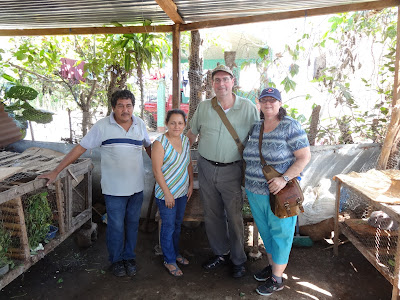F2F Updates from the Field: Robert and Sydne Spencer's Work in Guatemala
 |
| F2F volunteers Robert and Sydne Spencer in Chocolá, Guatemala |
Robert's background in small animal production and extensive experience in goat, sheep, and rabbit meat production originally sparked his participation in the Guatemala F2F program in April 2015. As follow-up, his second assignment was to address good handling practices for rabbit meat production. When Robert identified that host organization Seeds for the Future was also in need of a specialist to address food safety and HACCP within rabbit meat processing and preparation, he was quick to recommend his wife, Sydne. Sydne has experience in quality assurance and in meat rabbit and dairy goat production and processing. This was her first F2F assignment and Robert and Sydne's first time working together with Farmer-to-Farmer. Below are notes from the field:
Week One:
Robert and Sydne completed
their first week of volunteer work in Chocolá, which is in the department of Suchitepéquez in southwestern Guatemala. During their first
week in Chocolá and surrounding communities, the Spencer’s accomplished the following:
- Visited, observed, and assessed:
 |
| Rabbit pen in Chocolá |
- 9 rabbit farms in Chocolá
- 10 rabbit farms in San Pablo
- 5 rabbit farms in Pacamache
- Observed typical Guatemalan preparation of rabbit in San Pablo
- Sydne trained technicians, community members, and families in food safety and HACCP in order to establish best practices when processing and cooking rabbit meat.
- Sydne also introduced two alternative styles (fried fillets & rabbit and vegetable soup) of rabbit preparation in Pacamache
- Robert trained technicians, community members, and families on best management practices in rabbit production in order to increase understanding of how to utilize local resources to improve production
Week Two:
During Week 2 of their assignment, Robert and Sydne traveled to the community of San Juan, Suchitepéquez. They conducted two days of training on:
 |
| Sydne Spencer conducting a training on rabbit meat processing |
- Basics of meat rabbit production
- Best management practices
- Biosecurity for rabbit production
- Marketing
- Processing of rabbits
- Preparation of rabbit meat with vegetables
During this second week of work, Robert and Sydne directly trained 40
adults, including 35 females and 5 males. They concluded their assignment by preparing a lunch that included rabbit meat with vegetables. Rabbit production is
a relatively new concept to much of Guatemala.
Robert and Sydne noted, "While the group was vaguely familiar with rabbit production, they had no idea of its potential including various
recipes. By the end of the two day training they were very enthused and were making plans to
introduce this practice to the communities they work with."

.png)

Comments
Post a Comment